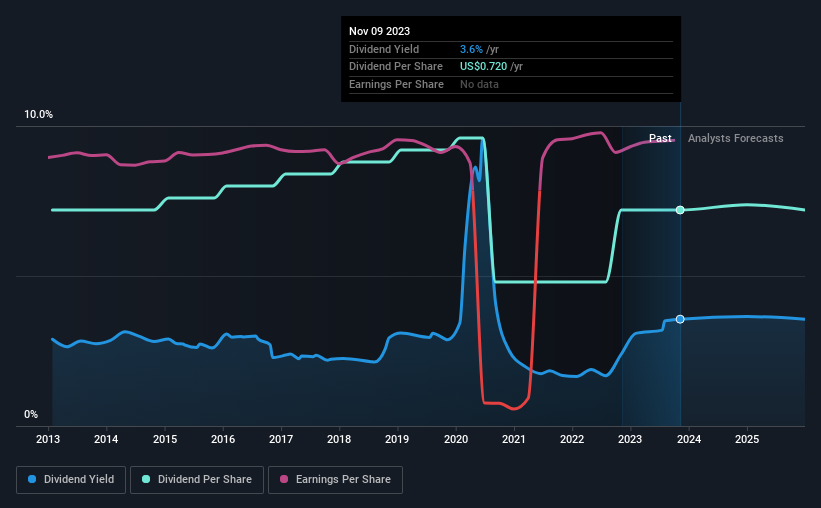- United States
- /
- Banks
- /
- NYSE:BHLB
Berkshire Hills Bancorp, Inc. (NYSE:BHLB) Passed Our Checks, And It's About To Pay A US$0.18 Dividend

Regular readers will know that we love our dividends at Simply Wall St, which is why it's exciting to see Berkshire Hills Bancorp, Inc. (NYSE:BHLB) is about to trade ex-dividend in the next 4 days. The ex-dividend date occurs one day before the record date which is the day on which shareholders need to be on the company's books in order to receive a dividend. The ex-dividend date is an important date to be aware of as any purchase of the stock made on or after this date might mean a late settlement that doesn't show on the record date. This means that investors who purchase Berkshire Hills Bancorp's shares on or after the 15th of November will not receive the dividend, which will be paid on the 30th of November.
The company's upcoming dividend is US$0.18 a share, following on from the last 12 months, when the company distributed a total of US$0.72 per share to shareholders. Looking at the last 12 months of distributions, Berkshire Hills Bancorp has a trailing yield of approximately 3.6% on its current stock price of $20.22. Dividends are an important source of income to many shareholders, but the health of the business is crucial to maintaining those dividends. As a result, readers should always check whether Berkshire Hills Bancorp has been able to grow its dividends, or if the dividend might be cut.
Check out our latest analysis for Berkshire Hills Bancorp
If a company pays out more in dividends than it earned, then the dividend might become unsustainable - hardly an ideal situation. That's why it's good to see Berkshire Hills Bancorp paying out a modest 31% of its earnings.
Generally speaking, the lower a company's payout ratios, the more resilient its dividend usually is.
Click here to see the company's payout ratio, plus analyst estimates of its future dividends.

Have Earnings And Dividends Been Growing?
Companies with consistently growing earnings per share generally make the best dividend stocks, as they usually find it easier to grow dividends per share. Investors love dividends, so if earnings fall and the dividend is reduced, expect a stock to be sold off heavily at the same time. For this reason, we're glad to see Berkshire Hills Bancorp's earnings per share have risen 14% per annum over the last five years.
Many investors will assess a company's dividend performance by evaluating how much the dividend payments have changed over time. Berkshire Hills Bancorp's dividend payments are broadly unchanged compared to where they were 10 years ago.
To Sum It Up
From a dividend perspective, should investors buy or avoid Berkshire Hills Bancorp? When companies are growing rapidly and retaining a majority of the profits within the business, it's usually a sign that reinvesting earnings creates more value than paying dividends to shareholders. Perhaps even more importantly - this can sometimes signal management is focused on the long term future of the business. In summary, Berkshire Hills Bancorp appears to have some promise as a dividend stock, and we'd suggest taking a closer look at it.
On that note, you'll want to research what risks Berkshire Hills Bancorp is facing. Our analysis shows 2 warning signs for Berkshire Hills Bancorp that we strongly recommend you have a look at before investing in the company.
Generally, we wouldn't recommend just buying the first dividend stock you see. Here's a curated list of interesting stocks that are strong dividend payers.
Valuation is complex, but we're here to simplify it.
Discover if Berkshire Hills Bancorp might be undervalued or overvalued with our detailed analysis, featuring fair value estimates, potential risks, dividends, insider trades, and its financial condition.
Access Free AnalysisHave feedback on this article? Concerned about the content? Get in touch with us directly. Alternatively, email editorial-team (at) simplywallst.com.
This article by Simply Wall St is general in nature. We provide commentary based on historical data and analyst forecasts only using an unbiased methodology and our articles are not intended to be financial advice. It does not constitute a recommendation to buy or sell any stock, and does not take account of your objectives, or your financial situation. We aim to bring you long-term focused analysis driven by fundamental data. Note that our analysis may not factor in the latest price-sensitive company announcements or qualitative material. Simply Wall St has no position in any stocks mentioned.
About NYSE:BHLB
Berkshire Hills Bancorp
Operates as the bank holding company for Berkshire Bank that provides various banking products and services in the United States.
Flawless balance sheet with reasonable growth potential.

